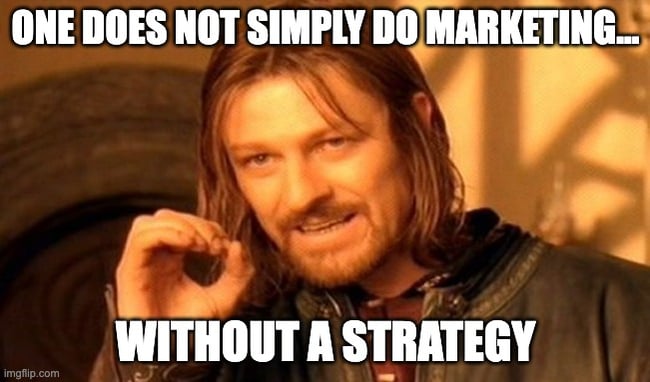There are a couple of truisms in marketing that get repeated so often they have almost lost their meaning. They are:
- Marketing strategy should be based on business goals
- Sales and marketing should be aligned
Yet, we have to keep banging on about these issues because neither of them is the modus operandi in every company, or even in most companies. You would be surprised how often we come across companies that have no marketing strategy, or they do but it is not aligned with business goals.
Considering how often the truisms get repeated the issue can’t be ignorance. So we picked truism número uno and did some research of our own.
Here’s what we found out about marketing strategies when we interviewed marketing leaders:
Problems with creating B2B marketing strategies
It probably comes as no surprise that the messiness of everyday work and internal misalignment are the biggest obstacles standing in the way of making an effective marketing strategy.
What I mean by the messiness of everyday work is the mountain of tasks that are waiting on marketing’s to-do list and the inevitable resource constraints that they are confined with.
There isn’t any capacity to make a strategy when you have to merely execute tactics all the time, or build foundations for marketing. It is the all-too-familiar dilemma of too much to do and too little time.

Internal misalignment manifests itself in many forms. Generally, this means that there are either disagreements, misunderstandings, or a lack of knowledge within the company about the important elements of strategy.
Here are examples of the internal challenges people we talked to have had while trying to create a marketing strategy on their own:
- Different understanding of the positioning or disagreements on what it should be
- Different definitions of ideal customers and target segments
- Finding a common vision that everyone can get on board with
- Getting everyone to dream at the same level, i.e. setting a vision that is far and ambitious enough
- Getting to a common understanding of how the company or a product should like after a certain period of time
- Getting everybody to work at the same speed and towards common goals
- Prioritizing and clarifying: goals, ideal customers, key messages, product focus, etc.
Internal misalignment is a big deal. Any one of those situations in a company can hinder growth efforts. If marketing and business have a different understanding of goals, ideal customers, targeted segments, and/or the company position, they are running in different directions.
The most alarming situation is when they don’t realize that they are doing so. Both are working on their own and scratching their heads trying to figure out why things aren’t working.
What to do in these situations?
Messiness of everyday work: shouting “TIME-OUT!” and jumping off the running wheel of mounting tasks takes courage. But it needs to happen for there to be any hope to make marketing sensible.
It also requires talking to management and convincing them that this is not the way to continue: that either you need more marketers to get everything done or then you need time to create a focused marketing strategy that helps you make choices, prioritize and say no.
By the way, in both of these situations, an agency can help.
Internal misalignment: this is trickier, especially if marketing and business don’t realize they are not aligned. If you have an inkling that things are not the way they should be, you need to start the detective work of finding out where the problem(s) are.
This requires a lot of internal discussions to discover if you are aligned and if you’re not, where the biggest issues are. You need to talk to leadership, sales, and maybe product to see the big picture and how all of you see marketing internally.
Once you have figured out the issues, then you can create a marketing strategy that is based on the business focus and goals.
Sometimes an outsider might be able to discover these issues better by auditing the marketing strategy.

Benefits of a business-focused B2B marketing strategy (hint: there are no downsides)
Business-focused marketing strategy makes everyone’s lives easier. It helps marketing say no to things that don’t contribute towards business goals, it takes away uncertainty as everyone sees all departments going in the same direction, it makes reporting easier and more focused, it helps to keep internal discussions on track, and prevents people from getting distracted by irrelevancies.
Generally speaking, the marketing leaders we spoke to, grouped the benefits of a good marketing strategy like this:
- Helps to prioritize and choose & unchoose
- Gives everyone a direction and a clear goal to run towards
- Functions as a backbone for marketing
- Helps to focus on the right things
- Brings marketing and business closer together
These are general benefits that conceal a lot of nuances. What exactly do those things mean in practice?
I am going to tell you something self-promotional next, but please bear with me. 🙏
Below is a list of benefits our clients have said about our strategy work. I'm showing this list here separately because it is more concrete than the generalized list above.
- Clarified our story, product's use cases, and target groups
- Helped to understand our customers and clearly described what they value and what their problems are
- Simplified the wording of our target groups and their characteristics
- Helped to understand the potential in the market
- Revealed a content gap in our work
- Laid the groundwork for marketing and gave a clear plan to move forward
- Improved internal commitment and motivation
- Gave us a focused positioning that is written down and got people behind it
- Gave us internal consensus on basic issues, and a unified direction
- Challenged to think in a new way and forced away from current ways of operating
I'm going to go ahead and claim that any one of those reasons would be enough on its own to be an argument for creating a marketing strategy that is aligned with the business.
If you want to know how we’ve done strategies with our clients, check out our work with Vapaus, Gapps, and TalentAdore.

Checklist for making a business-focused marketing strategy
If you google “how to make a marketing strategy”, you’ll get a gazillion results (or thereabouts). So let me save you from the trouble.
Here are the steps you need to take to create a marketing strategy that is aligned with your business.
- Get really familiar with the business – learn everything you can about the business: goals, target groups, best customers, focus areas, challenges, and what the business management thinks.
- Do customer research – understand your customers inside out: their pain points, daily struggles, what they are interested in, how they want to buy, etc.
- Analyze your data – get your hands on all the data you can about marketing and sales, and dive into it. Include both qualitative and quantitative data: site traffic, advertising data, conversion reports, key sales figures, results of the aforementioned customer survey, potential customer feedback, and so on.
- Based on the previous, identify the biggest bottlenecks of growth, and the biggest opportunities for growth
- Prioritize: which bottlenecks and opportunities you should solve now?
- Make a plan for how to tackle the bottlenecks (and #protip: you can call this a roadmap)
- Share your insights, priorities, and plans with the business and with any internal stakeholders whose buy-in you need.
- Execute.
- Report to the people in step 7.
- Choose the next ones on your priority list and repeat steps 6-9 (and when needed, repeat steps 1-9).
Or: audit your current strategy
As already mentioned, sometimes the issue is not the lack of strategy. Sometimes the issue is having a strategy that is not aligned with the business strategy. And sometimes companies are blind to that situation or find it hard to solve that situation. In that case, it is worth auditing your marketing strategy.
A marketing strategy audit will help you to:
- Find out how effective your marketing strategy is
- See if your marketing and business are aligned
- Uncover gaps in your marketing strategy in relation to business
- Understand if customers see you the way you want them to
If you’re interested, give us a shout.



